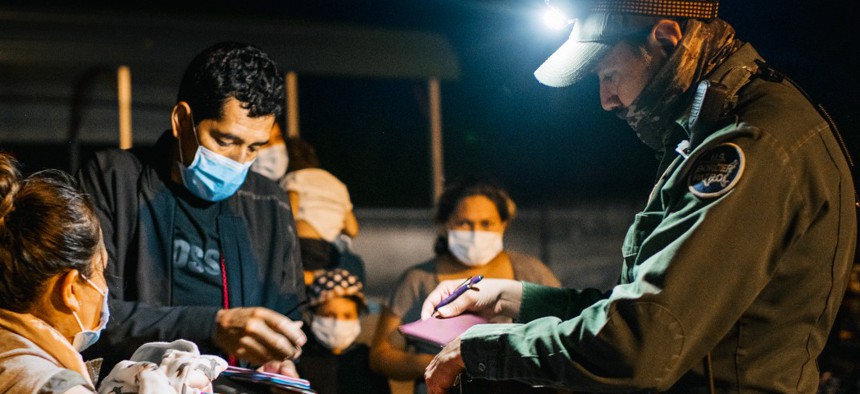CBP Revitalizes Biometric Data Collection At Border

Brandon Bell/Getty Images
Customs and Border Protection jumpstarted a DNA collection program in fall of 2021 to verify family relations, but will not store data it in the FBI's Combined DNA Index System.
This past fall, the Department of Homeland Security’s Customs and Border Protection implemented DNA collection technology in its immigration processing operations, moving in sync with the agency’s long-standing initiative to use personal data to verify identities at the southwest border.
Documented in a report by DHS’s Office of the Inspector General, CBP elected to start its initial DNA collection pilot programming in September 2021, primarily to ensure children and parents arriving at the U.S.-Mexico border are related.
Other sub-agencies, including Immigration and Customs Enforcement, initially adopted similar Rapid DNA testing technology. As ICE’s pilot programs came to a close, CBP coordinated with other officials to restart DNA collection procedures.
“On May 13, 2021, ICE HSI decided its pilot program along the southwest border to test DNA based on CBP parentage concerns would end on September 12, 2021,” the report reads. “Because CBP did not have a similar DNA testing capability, ICE HSI's decision to end Rapid DNA testing in 4 months created a potential lapse in DNA testing required for DHS to separate children from unrelated adults.”
The report states that the DNA collection and analysis is primarily focused on confirming parent-child relationships in the absence of documentation. According to the audit, Rapid DNA testing data is destroyed after analysis and is not sent to the Federal Bureau of Investigation's Combined DNA Index System, which acts as the government's national DNA database.
OIG officials conducted multiple interviews with DHS and CBP officials, looked at data collection processes and analytics, and ultimately issued no recommendations to the ongoing program. DNA testing services are available at 18 U.S. Border Patrol and Office of Field Operations locations.
“We determined the data sufficiently reliable for our audit purposes,” the report concluded.
DHS has received backlash for its collection and storage of immigrant data in the past. In 2020, the Trump administration launched a DNA collection pilot program at two locations: one near the U.S.-Canada border and the other at the U.S.-Mexico border.
Nextgov reached out to ICE and CBP for comment.
Unlike the Trump administration initiative, CBP’s DNA sample collection will not be added to the large Combined DNA Index System housed by the Federal Bureau of Investigations, as pursuant to the DNA Fingerprint Act of 2005.
Other government agencies have felt the public pushback against biometric data collection, with the Internal Revenue Service relinquishing the use of facial recognition technology as an option for filing taxes this season.
A bipartisan force on Capitol Hill fueled the rallying cries to halt the use of biometrics, citing invasions of privacy and security risks.






